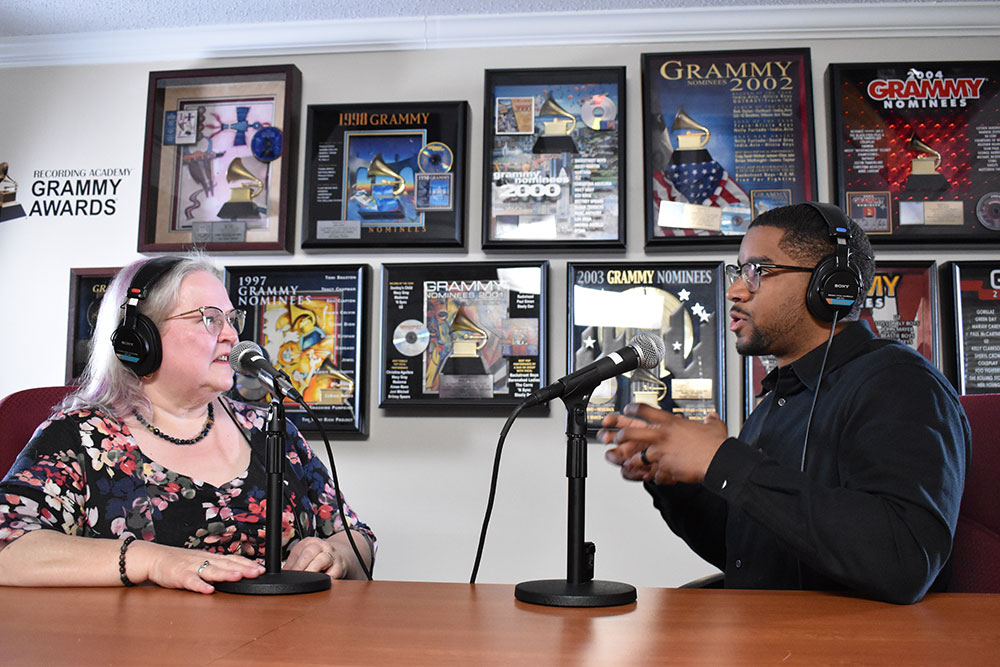
PhD Student Invited to Exclusive Doctoral Consortium in Munich
KENNESAW, Ga. | Dec 5, 2019
Jason Williams is studying the use of IT in the workplace
When Jason Williams enrolled in Kennesaw State University’s doctoral business program, he was intimidated by its focus on conducting academic research. Two years later, his research on technology in the workplace has earned him an invitation to one of the world’s most prestigious information systems consortiums.
Williams, a student in the Michael J. Coles College of Business Doctor of Philosophy in Business Administration program, is one of only 40 doctoral students from around the world selected to participate in the 2019 International Conference of Information Systems Doctoral Consortium. The event will be held Dec. 11-14 at the Schloss Hohenkammer seminar center and hotel in Munich, Germany.

For more than 30 years, the ICIS Doctoral Consortium has provided students with the opportunity to present their IS research to peers and faculty from around the world. Participants gain valuable feedback on their dissertations, learn more about careers in academia, and grow their professional networks.
“It’s going to be great to network not only with the senior scholars, but with folks in the same boat as me who are just now getting into the academic world,” says Williams, whose goal is to become a college professor of information systems. “Making those connections will be helpful going forward in my new career.”
The research Williams will present – called the Theory of Workplace IT Use – examines how employees in an organization use technology to do their jobs. Williams finds that, in a professional setting, people are either 1) learning to use a piece of technology, 2) becoming proficient in its common functions, or 3) discovering innovative ways to solve problems with it.
While the desire in many organizations is to always encourage employees to innovate with technology, in other businesses, doing so could create unnecessary problems. Williams wants to help organizations determine when innovation will enhance success and when it could impede it.
“If you’re in a CPA environment, you don’t want people being innovative when they’re doing other people’s taxes,” Williams says. “You want to tone down those influences to innovate and tone up the influences that standardize operations and make technology sink into the background. There’s efficiency and effectiveness, which can sometimes be at odds with each other.”
Williams’ dissertation committee submitted his research to the ICIS for consideration because of its unique subject and its educational and practical applications.
“IT use is a central concept that forms the basis of all the benefits we receive from technology,” says Dr. Saurabh Gupta, Williams’ dissertation committee chair and the IS Discipline Lead in Kennesaw State’s PhDBA program, “and how humans interact with technology is only now being understood. Jason’s work focuses on an empirical evaluation of both of these concepts, and will have great practical and research-based benefits.”
Acceptance into the ICIS Doctoral Consortium is highly exclusive. The ICIS selects 40 people each year and will not accept two students from the same university. Only 12 of this year’s participants are from the United States.
Williams describes his acceptance into the consortium as a “humbling experience,” adding that he plans to do everything he can to successfully represent his research and Kennesaw State University.
Williams currently serves as director of the Project Management Office at Georgia Southern University, where he earned his undergraduate IS degree in 2003 and his Master of Business Administration in 2007. In addition to leading a team of IT project managers, Williams has also periodically taught undergraduate IS and IT classes for the university as an adjunct instructor.
His desire to become a full-time professor brought him to the Coles College’s PhD program in 2017. Its unique once-a-month residency model – classes meet one weekend a month for the first two years – appealed to him because he had recently started a family and did not want to leave his job. However, he initially found the third-year requirement to conduct scholarly research somewhat intimidating.
“I’ve always really enjoyed teaching and mentoring,” he says. “Being able to do that professionally is why I first started pursuing a career in academia. Then, I found out that to do that I would have to do research, which isn’t something I had really done before. Luckily, I learned that I actually really enjoy it, which is very encouraging.”
Gupta says that Williams possesses exemplary skills as a researcher and a student, which will serve him well at the ICIS Doctoral Consortium and later when he becomes a professor.
“Jason spends time thinking critically and evaluating concepts,” he says. “He is an excellent writer and communicates his work well.”
Williams says he owes much of his success to the efforts of Gupta and the other members of his dissertation committee, including Dr. Adriane Randolph, director of the Coles College BrainLab, and Dr. Stacie Petter, information systems professor at Baylor University. He is also grateful to the Coles College Department of Information Systems for funding his trip to Munich for the consortium.
Among the benefits Williams hopes to gain from the event is a broader understanding of IS and how he might incorporate that into his ongoing research into workplace IT, which he plans to publish after he graduates next year.
“Getting feedback from the senior scholars will be the most helpful thing for where I am right now,” he says. “I’m guaranteed to get feedback that’s different from what I’ve gotten in the past, and that is going to be really valuable for me going forward.”
-Patrick Harbin
Related Posts

Kennesaw State Partnership Equips Local Entrepreneurs with Tools for Success

Gathering Spot CEO Ryan Wilson on Building a Social Club to Inspire Connections.

Kennesaw State MBA student leveraging degree work for a cause

CEO Magazine Ranks Kennesaw State Executive MBA Top Program in Georgia, No. 11 in the World














